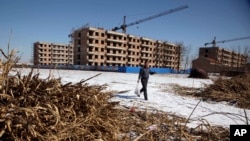BEIJING —
China will stick with policies to maintain food self-sufficiency and protect farmland from urban encroachment, dampening speculation that new reforms would give the market a bigger say in food supply and rural development.
A meeting of the ruling Communist Party attended by President Xi Jinping said China would continue to ensure that at least 1.8 billion mu (120 million hectares) of rural land would be reserved for agricultural use, a policy known as the “red line”, China Central Television (CCTV) reported.
Prominent researchers and economists have called on the government to abandon the “red line”, and have also said it should relax its long-standing 95-percent self-sufficiency target and make better use of global markets.
While the report did not mention the 95-percent figure, it said self-supply would remain the key to China's efforts to “seize the initiative on food security”.
Beijing has identified food security as one of its biggest challenges over the next decade, with its population still rising and vast tracts of its farmland already swallowed up as a result of rapid urban and industrial growth.
With millions of additional farmers also set to desert the countryside for the cities in the coming years, Beijing's priority is also to encourage farmers to stay put. It employs an extensive stockpiling program to prop up domestic grain prices and guarantee rural incomes.
China will also seek to create a better-paid “professional” farming sector and improve services and infrastructure in the countryside, the Tuesday meeting said.
China unveiled a series of reforms in November that would lift restrictions on the transfer of collectively-owned land.
But senior officials have made it clear that the market would continue to play only a limited role in land transfers and that food security remained the “bottom line”.
A meeting of the ruling Communist Party attended by President Xi Jinping said China would continue to ensure that at least 1.8 billion mu (120 million hectares) of rural land would be reserved for agricultural use, a policy known as the “red line”, China Central Television (CCTV) reported.
Prominent researchers and economists have called on the government to abandon the “red line”, and have also said it should relax its long-standing 95-percent self-sufficiency target and make better use of global markets.
While the report did not mention the 95-percent figure, it said self-supply would remain the key to China's efforts to “seize the initiative on food security”.
Beijing has identified food security as one of its biggest challenges over the next decade, with its population still rising and vast tracts of its farmland already swallowed up as a result of rapid urban and industrial growth.
With millions of additional farmers also set to desert the countryside for the cities in the coming years, Beijing's priority is also to encourage farmers to stay put. It employs an extensive stockpiling program to prop up domestic grain prices and guarantee rural incomes.
China will also seek to create a better-paid “professional” farming sector and improve services and infrastructure in the countryside, the Tuesday meeting said.
China unveiled a series of reforms in November that would lift restrictions on the transfer of collectively-owned land.
But senior officials have made it clear that the market would continue to play only a limited role in land transfers and that food security remained the “bottom line”.








